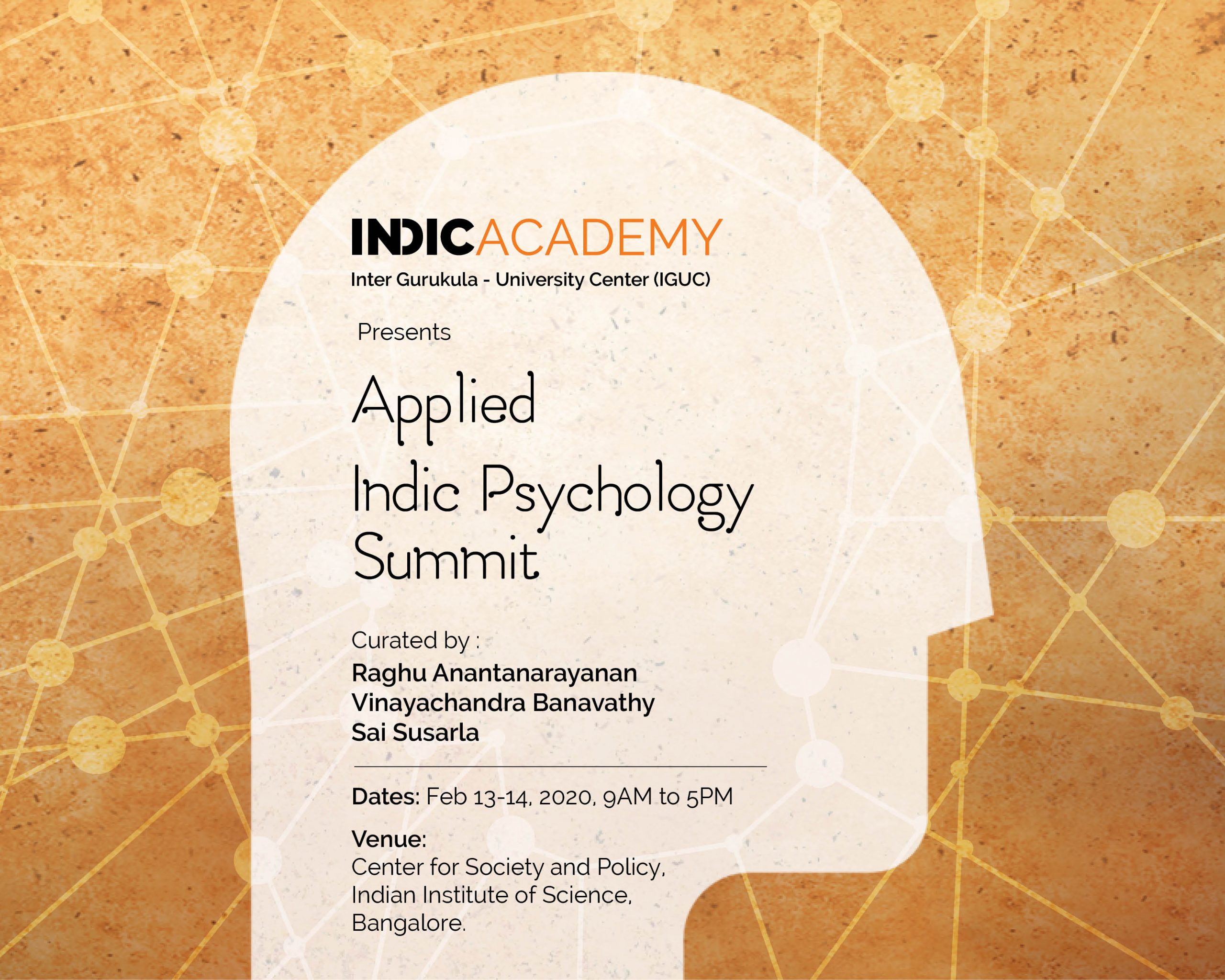Indic Academy Inter Gurukula University Center is happy to announce Applied Indic Psychology Summit to be held at Indian Institute of Science, Bengaluru, on 13th and 14th February, 2020.
The field of Applied behaviour as it is practiced in India, is highly influenced by western ideas. Since it is assumed that these ideas are universal, the influence of these on leadership and executive behaviour is very high. While the western thinkers in the field of psychology have constantly borrowed and digested eastern ideas, the bulk of the practitioners in India simply swallow the western ways.
The area of coaching and facilitation has many people who would like to be more anchored in the Indian thought, but due to the market pressures, as well as the paucity of credible institutions to learn from, they flock to western certification processes.
The Academic space in India has not been very favourable to Indian Psychology. Traditional scholars with a deep understanding of Indic wisdom are not conversant with the language of psychology; and therefore unable to contribute to the field.
Creating a platform that falls at the intersection of these three (namely, the current practice of coaching/ facilitation, academia, and traditional scholarship) is important. This platform can encourage serious study and certification as well as support action research using Indian frames of thinking.
The initial two-day dialogue will explore these ideas and come out with a set of foundational principles that will become the basis for sustained action over a longer term. It is hoped that this effort will create a body of practitioners who will establish the vibrancy and effectiveness of the Indian wisdom in the area of mind sciences.
Charter of the Summit:
– SWOT Analysis: Opportunities and Challenges for mainstream practice of Indic Psychology
– Recommendations for Next steps
– Suggested Research directions in Applied Indic Psychology
Key topics for discussion:
– What are the key divergences and convergences in concepts like self, consciousness between western and Indic ways? What is the impact of this in the practice of Applied Psychology?
– Developing the field of AIP asks for creating a bridge between traditional Indic scholars, academics, and practitioners of applied psychology
– It requires a platform where nascent ideas can be validated through action research
– It requires a platform where the principles and the practice can be imparted to a wide section of behavioral scientists.
Through this platform, we would like to have a healthy dialogue with institutions where psychology is taught and practiced so that we enable mutual learning and growth. We do not want to replicate or compete with the existing institutions that certify people in process work/ facilitation and coaching. We would like to supplement and complement the learning that is imparted in these institutions with a distinct practice of Applied Indian Psychology
We will then look at some of the possible ways in which we could do this, for example:
– To offer a clear curriculum of study in Applied Indic Psychology that complements existing certifications.
– To enable in-depth dialogues between traditional scholars, academics in the area of Indian Psychology and practitioners of behavioural sciences.
The outcome of the deliberations will be an action charter that will be taken forward by a small group that will anchor this effort.
Concept Curators: Raghu Anantanarayanan, Vinayachandra B, Sai Susarla
Venue: Center for Society and Policy, Indian Institute of Science, Bangalore
Accommodation: Hoysala Guest House, Indian Institute of Science, Bangalore
Dates: Feb 13-14, 2019, 9 am to 5 pm.
Who can Attend:
– Practitioners of Organizational Behavior, Leadership, Coaching and Counseling, Corporate Development, Psychology Professionals and Faculty, Educationists in Indic Psychology, Experts in Indic Wellness-related Shastras (Yoga, Ayurveda, Tantra, Vedanta)
– By invitation only. Limited to 20-25 participants.
Disclaimer: The opinions expressed in this article belong to the author. Indic Today is neither responsible nor liable for the accuracy, completeness, suitability, or validity of any information in the article.






